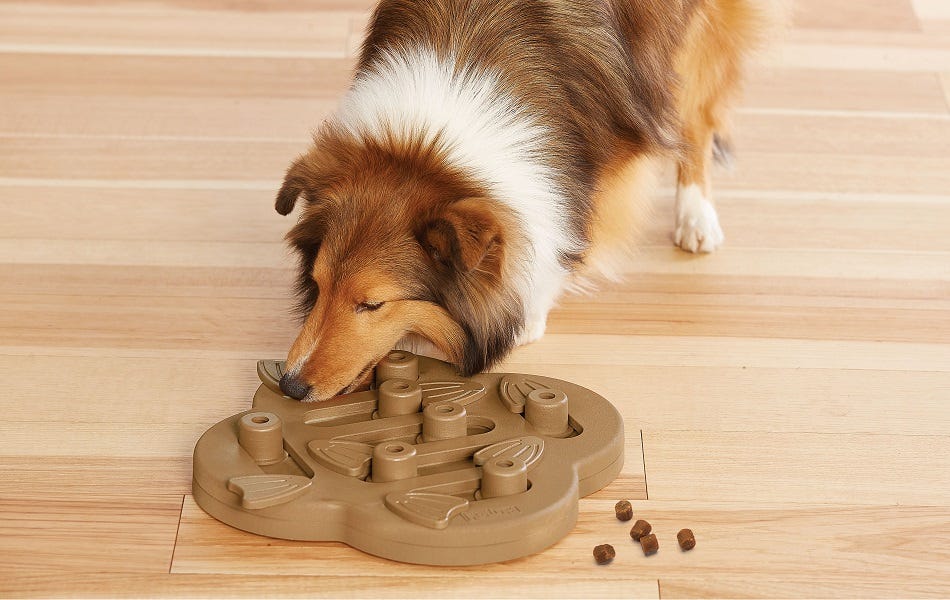Leaving a puppy home alone can come with plenty of stress and anxiety – for both you and them. While your schedule might need to flex a little around your new puppy, it’s inevitable that you will have to leave them at some point. Whether it’s work or other commitments, it's important to help your pup learn how to be happy and comfortable without you.
Learning to be alone is an important part of your puppy's training and can help lessen separation anxiety. Without the appropriate training, it’s easy for your dog to get bored and stressed, often leading to damaged furniture or anything else they can get their noses into!
We’ll take you through everything you need to know about leaving a puppy at home alone!
How long can you leave a puppy alone at home?
The amount of time your puppy can be alone depends on how old they are. Leaving a puppy alone while you’re away at work takes up the majority of the day. Since puppies aren’t used to being alone, they are more likely to develop separation anxiety. While the general consensus is that you can leave them home one hour every day, the length of time will depend on how long they can hold their bladder. If your pup is under 12 weeks, then you won’t want to leave them alone for more than two hours. However, as soon as they hit the six-month mark, you should be confident leaving a puppy alone for 8 hours.
How to train your puppy to be alone
Dogs are incredibly social animals and love to be around you and your family. However, with a little time and effort, you can help them feel calm and confident when they’re left alone.
Use a puppy-safe area
Create a space where your puppy will feel safe in. Use an exercise pen or crate, or even cordon off a section of your house with baby gates. Fill the space with their favourite toys and blankets so they know it isn’t a punishment, but rather a place they can go to relax.
Feed your pup meals inside this chosen space to help them see it as something positive. If the area is large enough, you can spend some time playing there with them. You can also set aside special toys that they only get inside their crate or pen, so it’s seen as a reward.
Teaching them to be alone
With a special space for them to go, you can start your puppy separation training. Begin by encouraging your pup into their space with a chew toy or constructive activity, like a treat puzzle. Quietly walk from the room, before returning and praising them. Repeat the process and increase how long you’re away.
As the time between leaving and returning gets longer, come back to check on them every now and then. If they are quiet, reward them with soft praise and a treat before you leave again – making sure you aren’t loud and don’t make too much of a fuss.
If your puppy whines when left alone, they might not yet associate the space with good things. Don’t make a habit of letting them out when they fuss. Instead, shorten the time of their confinement and then slowly build up again.
Handy tip: remember that the pen or crate is only temporary. When you feel confident that your puppy is okay on their own –and won’t tear up your house – you can start giving them more access to your home, one room at a time.
How to stop your puppy from crying when left alone
It can be hard to leave the house if your puppy cries when left alone. While there’s no ‘harm’ in puppy howling, it can definitely upset your neighbours and leave you with an anxious pup. Here are some tips:
- Take them out for walks: built-up energy needs to be burnt off. It’s best to try and take your pup for a walk, or at least have an intense play session, to help them relax before you leave for the day. An alternative is also a 'sniffari', this is a walk where you let your dog sniff to their heart's content (it's also a great opportunity to practice your dog's recall). This provides great mental stimulation and exercise at the same time.
- Set a routine: get your pup on a consistent, reliable routine they can adjust to. That way they have no nasty surprises that will leave them feeling anxious.
- Don’t make a fuss about leaving or coming home: don’t give them a dramatic farewell. Instead, offer a quick pat and be on your way. When you get home, follow the same low-key return.
- Carry out some crate training: some dogs may feel more anxious in a crate, while others will see it as a calm den for them to relax. Learn how to crate train your pup to make their time inside as stress-free as possible.
How to keep your puppy entertained
A bored pup can easily become a stressed and destructive puppy – especially since their biggest source of fun is you. Puppies will naturally try and occupy themselves, whether that’s by staring out the window or playing with their favourite toy. However, there are some helpful ways to keep them happy and stress-free when home alone:
- Leave out their favourite toys.
- Set up treat puzzles.
- Get creative with their treats by freezing them on a hot day.
- Set up their bed near the window to encourage them to watch the world outside.
- Set up a screen with YouTube for dogs.
Keeping your dog stimulated while you’re away is the best way to avoid trouble. While puzzles or treats won’t replace a good old walk in the park or play session with their favourite humans, these games can help them pass the time while you’re gone.
With these tips, you won’t have to worry about waving goodbye to your pup when you head out for the day.
FAQ:
Is it okay to leave my 8-week-old puppy?
Yes, but not for a long period of time. 8-week-old puppies should only be left for an hour or so. Any longer and they’ll need to use the bathroom or may become stressed and anxious.
Is it OK to leave a puppy alone for 8 hours?
Eight hours should always be the absolute maximum you leave your puppy home alone – and only once they are over six months old. However, if your pup is outside or has access to the yard for a bathroom break, they may be okay being left alone for eight hours from a younger age. If you think you’re going to be away longer, it’s always best to get someone to pop in to check on them.
Can I leave my puppy in a crate?
Crate training can be a powerful tool to help your pup relax when they’re sleeping or being left home alone. However, that doesn’t mean you should leave them in a crate all day. Crates should be used as a temporary house-training measure before you build up enough trust to let your pup roam the house freely.















